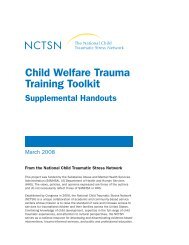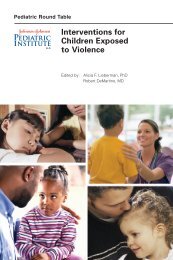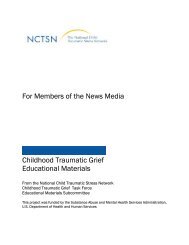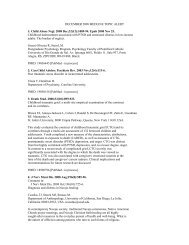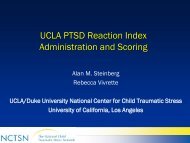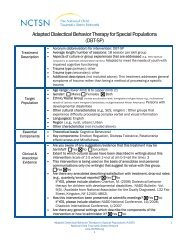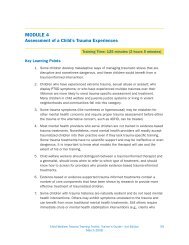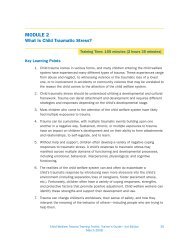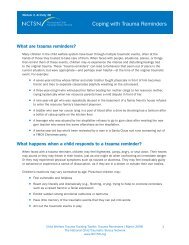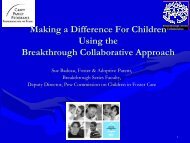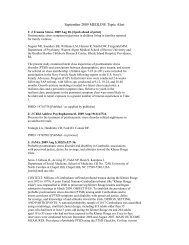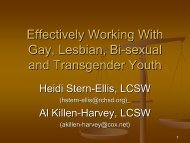Case Vignette—Andrew - National Child Traumatic Stress Network
Case Vignette—Andrew - National Child Traumatic Stress Network
Case Vignette—Andrew - National Child Traumatic Stress Network
You also want an ePaper? Increase the reach of your titles
YUMPU automatically turns print PDFs into web optimized ePapers that Google loves.
Module 3, Activity 3D<br />
<strong>Case</strong> <strong>Vignette—Andrew</strong><br />
<strong>Child</strong>: Andrew<br />
Age:<br />
Point in the <strong>Child</strong> Welfare System: <strong>Child</strong> has been in foster care for all of his life. He<br />
has had approximately six foster home placements, including a failed adoption. The goal<br />
continues to be adoption.<br />
Trauma Type: Physical abuse, abuse in foster home, exposure to violence in foster home,<br />
and repeated moves<br />
Culture/Ethnicity: This child could be of any racial or cultural background.<br />
<strong>Case</strong> Exercise<br />
. Read aloud the Presenting Situation and Background/History.<br />
2. Read aloud the Evaluation/Assessment section.<br />
a. Generate ideas about Andrew’s behaviors and responses to the traumatic<br />
event(s) in his history. Discuss why he may respond in these ways, including how<br />
these responses may be related to traumatic experiences and ongoing stressors.<br />
b. Think specifically about your group’s assigned Essential Element, and identify<br />
potential areas for intervention for the child welfare worker in this case to<br />
consider. Be prepared to present at least three ideas to the larger group.<br />
c. Discuss how your approach to this case might differ if the children’s gender,<br />
age, or culture was different than the vignette specified, and why.<br />
. AS TIME ALLOWS: After completing the case analysis of Andrew, discuss cases<br />
that members of your group have worked with. Apply the three Essential Elements<br />
we have discussed so far to your discussion. You are encouraged to review and<br />
integrate relevant parts of the Comprehensive Guide into your discussion.<br />
Presenting Situation<br />
Andrew is a -year-old boy who is now living in his sixth foster home placement since<br />
entering state custody at 2-months-old. He and his two older brothers were placed for<br />
adoption about one year ago, however, that placement was disrupted because all three<br />
children were too much for the adoptive family to handle. At this time Andrew continues to be<br />
eligible for adoption and attempts to find a permanent home for him are ongoing.<br />
Andrew’s current foster mother describes this child as very loving, but in need of a lot of love and<br />
attention. She describes him as having low self-esteem and in need of lots of praise. Andrew’s<br />
teacher reports that he is at times withdrawn, pessimistic or sad. She also reports that Andrew<br />
has difficulty comprehending and completing schoolwork in a variety of academic areas.<br />
<strong>Child</strong> Welfare Trauma Training Toolkit: <strong>Case</strong> <strong>Vignette—Andrew</strong> | March 2008<br />
The <strong>National</strong> <strong>Child</strong> <strong>Traumatic</strong> <strong>Stress</strong> <strong>Network</strong><br />
www.NCTSN.org
It sometimes concerns her that he has difficulty making decisions, lacks creativity, has weak<br />
study skills and is poorly organized. She stated that Andrew can easily be upset, frustrated,<br />
or angered in response to environmental changes. She said he sometimes has difficulty<br />
controlling and maintaining his behavior and mood. He has a tendency to react negatively<br />
when faced with changes in everyday activities or routines.<br />
The foster mother reports having moderate problems with disruptive, impulsive and<br />
uncontrolled behaviors in Andrew. She said Andrew is sometimes aggressive, argumentative<br />
and threatening to others. He does sometimes break rules related to cheating, deception or<br />
stealing. She said she has noticed that he has difficulty complimenting others and making<br />
suggestions for improvement in a socially acceptable manner. Like his teacher, the foster<br />
mother reports that he demonstrates poor expressive and receptive communication skills,<br />
and has difficulty seeking out and finding information on his own.<br />
On a positive note, Andrew seems to enjoy playing outdoors, riding bikes, being around and<br />
helping to feed the animals, and playing video games. He is very helpful at home with chores<br />
and can be a good listener. He is very outgoing and full of energy.<br />
Background/History<br />
At the age of one month Andrew was placed in custody based on allegations of severe child<br />
abuse in the form of multiple skull fractures. Andrew and his two older siblings were placed<br />
with relatives, but they were later removed to a foster home.<br />
Prior to this incident there were other reports of neglect. CPS records revealed that on one<br />
occasion the mother failed to give Andrew and his siblings baths and that she did not feed<br />
them. There were also reports that the children had scabs and the mother picked them until<br />
they bled. Homemaker services were put in place.<br />
In subsequent reports there were allegations that the family was living in inadequate housing<br />
with no running water. There was also a report that the father spanked the oldest child,<br />
placed him in a dark room at night and locked the door. It was further alleged that the oldest<br />
child had a black eye as a result of this spanking. When the parents were confronted, they<br />
adamantly denied the abuse. The family later moved out of state.<br />
There is concern that Andrew has above average knowledge of sex. It is suspected that he<br />
may have witnessed sexual activity, been a victim of sexual abuse or a participant in sexual<br />
behaviors with his brothers. He has stated that his brothers have “touched each other’s<br />
private parts.” The current foster mother does not report any sexual acting out.<br />
<strong>Child</strong> Welfare Trauma Training Toolkit: <strong>Case</strong> <strong>Vignette—Andrew</strong> | March 2008<br />
The <strong>National</strong> <strong>Child</strong> <strong>Traumatic</strong> <strong>Stress</strong> <strong>Network</strong><br />
www.NCTSN.org<br />
2
Andrew is in the 2nd grade. He is in resource classes and continues to be tested to assure his<br />
educational needs are being met. He has a difficult time with reading, spelling and language<br />
comprehension. He is strong in math. Testing indicates the presence of a learning disability.<br />
Upon entering foster care Andrew lived with his paternal grandmother for one month. He was<br />
then placed in his first foster home. Three attempts were made at reunifying Andrew and<br />
his two older brothers with his birth mother but this proved unsuccessful. Andrew and his<br />
siblings lived in their first foster home for about seven years.<br />
In the last two years, the children have had four additional placement changes, sometimes<br />
together and sometimes separately, as well as a disrupted adoptive placement. Each of<br />
the placement changes and disruptions were due to the behaviors of the children. After the<br />
adoptive placement was disrupted, all three children went to separate foster homes where<br />
they currently reside. Given the young age at which he was placed with his first family of<br />
seven years, Andrew came to view them as his parents.<br />
It was discovered that he witnessed domestic violence on a regular basis while in this<br />
foster home. The severity of the abuse he witnessed is not clear. It was learned that the<br />
punishments he received in this home were overly severe. There were some reports of childon-child<br />
sexual abuse in this home.<br />
The children’s parents’ rights were terminated in 2002. Andrew is aware that he is free to be<br />
adopted. He does not fully understand all the concepts of adoption but understands that the<br />
goal is permanence.<br />
Evaluation/Assessment<br />
Andrew is described as a very loving and openly affectionate child but is often quick to put others<br />
down to make himself look better. He can get “wound up” quickly and either throw, stomp, or<br />
slam doors if he is told to do something he does not want to do. He requires lots of praise.<br />
Andrew can sometimes function well in a family, being agreeable at times with picking up his<br />
toys and other chores. It is reported that he occasionally has nightmares and will frequently<br />
talk in his sleep.<br />
Currently the child is in speech therapy at school. While he can be mostly understood, he<br />
has difficulty expressing his thoughts and using words correctly. He speaks loudly. Andrew<br />
has had individual and group therapy with his siblings in the past. So far, Andrew has<br />
been in eight different schools. Recent psychoeducational testing indicated that Andrew<br />
demonstrates the warmth and neediness of a young child and that he has signs of ADHD,<br />
anxiety, and depression.<br />
<strong>Child</strong> Welfare Trauma Training Toolkit: <strong>Case</strong> <strong>Vignette—Andrew</strong> | March 2008<br />
The <strong>National</strong> <strong>Child</strong> <strong>Traumatic</strong> <strong>Stress</strong> <strong>Network</strong><br />
www.NCTSN.org


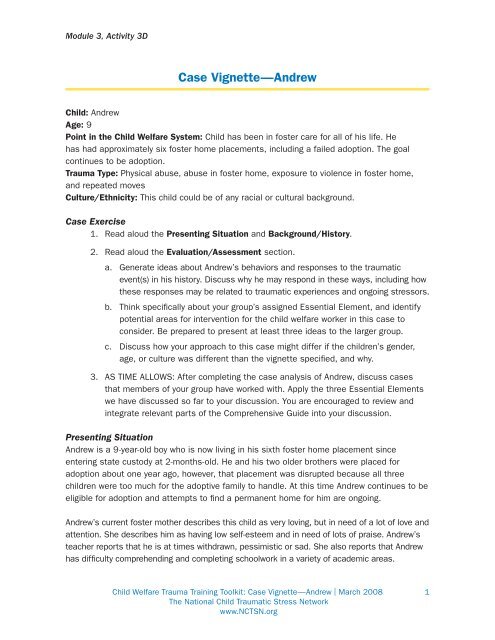
![Chinese [PDF | 949 KB] - National Child Traumatic Stress Network](https://img.yumpu.com/21942479/1/184x260/chinese-pdf-949-kb-national-child-traumatic-stress-network.jpg?quality=85)
